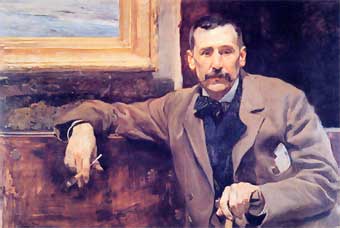- Benito Pérez Galdós
Infobox Writer
name = Benito Pérez Galdós

birthdate = birth date|1843|5|10|mf=y
birthplace =Las Palmas de Gran Canaria ,Canary Islands
deathdate = death date and age|1920|1|4|1843|5|1|mf=y
deathplace =Madrid ,Spain
occupation = Novelist, playwright, politicianBenito Pérez Galdós (
May 10 ,1843 –January 4 ,1920 ) was a Spanish realistnovelist . Considered second only toCervantes in stature, he was the greatest Spanish realist novelist. He was born inLas Palmas de Gran Canaria ,Canary Islands , and, when nineteen years old, he moved toMadrid , where he spent most of his adult life. In Spain, most popular are the early works: the "Episodios nacionales " (46 volumes), outside Spain his "Novelas españolas contemporáneas" are more popular.The early novels mix historical and fictional characters and are the result of documentary research. As in Balzac's novels, some characters reappear in different novels. They cover the time from 1805 to the end of the 19th century, providing glimpses of Pérez Galdós's liberal and anti-clerical views, which are developed in the contemporary novels. In "
Doña Perfecta " (1876) a young liberal arrives to a stiflingly clerical town. In "Marianela " (1878) a young man regains his eye sight after a life of blindness and rejects his best friend Marianela for her ugliness. In "Miau" (1888) a pretentious family lose their livelihood when the father, an aged civil servant, loses his job because of a change in government, and eventually kills himself.Pérez Galdós's masterpiece is "
Fortunata y Jacinta " (1886–1887), almost as long as "War and Peace" and concerns the fortunes of four characters: a young man-about-town, his wife, his lower-class mistress, and her husband. "Ángel Guerra" (1891) tells of an unbalanced man who attempts to win a devout and inaccessible woman, swinging fromagnosticism toCatholicism in the process.In 1886 then prime minister
Práxedes Mateo Sagasta appointed him as the (absent) deputy for the town and district ofGuayama ,Puerto Rico at the Madrid parliament; he never visited the place, but had a representative inform him of the status of the area, and felt a duty to represent its inhabitants appropriately. In 1897, Pérez Galdós was elected to theReal Academia Española (Royal Spanish Academy). In 1907 he became a deputy for the Republican Party in the parliament. He went blind in 1912 but continued to dictate his books for the rest of his life. Pérez Galdós died at the age of 76. Shortly before his death, a statue in his honour was constructed in theParque del Retiro , the most popular park in Madrid, financed solely by public donations.Pérez Galdós was, and remains greatly popular in Spain, where he is considered the Spain's equal to Tolstoy. As recently as 1950, few of his works were available translated to English, although he has slowly become popular in the Anglophone world.
His plays are generally considered to be less successful than his novels, though "Realidad" (1892) is important in the history of realism in the Spanish theatre.
His novels have yielded many cinematic adaptations: "Beauty in Chains" ("Doña Perfecta") was directed by
Elsie Jane Wilson in 1918; "Viridiana " (1961), byLuis Buñuel , is based upon "Halma"; Buñuel also adapted "Nazarín" (1959) and "Tristana " (1970); "La duda" was filmed in 1972 byRafael Gil , "El Abuelo" (1988) ("The Grandfather"), byJosé Luis Garci , was internationally released a year later; it previously had been adapted as the Argentine film, "El Abuelo" (1954).External links
* [http://www.shef.ac.uk/gep/urey.html The Pérez Galdós Editions Project]
*
*
* [http://www.cervantesvirtual.com/bib_autor/Galdos/ Galdós site, Biblioteca Virtual Miguel de Cervantes] (in Spanish)
* [http://www.casamuseoperezgaldos.com/ The Galdós House Museum.] The Museum is set up in Pérez Galdós' birth place in Gran Canaria. (in Spanish)
* [http://digitalcommons.unl.edu/modlangspanish/11/ Benito Pérez Galdós] Published in "The Cambridge History of Spanish Literature" (2004)
Wikimedia Foundation. 2010.
